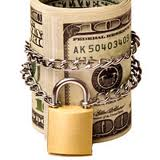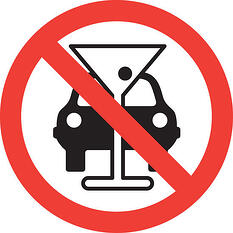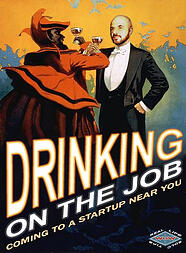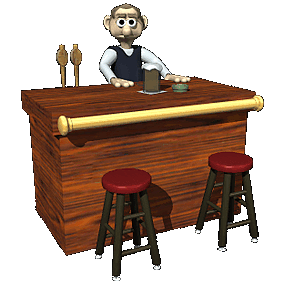ARE YOU REALLY READY TO OWN AND OPERATETO OWN AND OPERATE A BAR
Part 3:
HUMAN RESOURCES
Human resources is the single most important function in the bar business, yet remains the overlooked, misunderstood, and taken for granted. If the bar manager is responsible for the hiring of staff, then he must have the ability to hire the right kind of people. He must know where to get them, what to look for on an application, and what questions to ask during the interview. It is necessary to describe what the specific job requires. For example: Bartenders must have the ability to give attention and recognition (the primary reason a customer returns to a particular bar—it’s not the drink!); they must be willing to take direction (the more experienced the bartender, for example, the harder it is to break them of their habits of doing things “their way”); and most importantly they must have a personality! They have to look alive, happy, and think of themselves as “show people,” constantly entertaining.
They must be honest and never succumb to the temptation of drinking while they work. A bar manager who drinks while on shift, or allows his bartenders to imbibe with customers, is not professional and doesn’t know what he’s doing (potential for law suits, uncontrolled environment, no workers comp protection if injured on the job, etc.). He is inviting problems. No job I know of allows workers to drink beverage alcohol while working.
The ultimate success or failure of your bar will be determined by those you hire. How well they do their job with cash and product, the frame of mind they are in when doing their job, and how they directly interact and impress each customer they serve directly affects your bar’s sales, profitability, and the length of time you will stay on as the bar manager.
Do you have a bartender’s manual, cocktail server’s manual, bar back manual, orientation manual, training manuals for all positions, etc., that describes exactly how you want everything done? Do you have the writing skills to create these manuals if need be? Have you documented your house rules about eating, smoking, free drinks, break privileges, payday, schedule posting, dating, using the company telephone, cell phone policy, personal belongings, accidents on the job, switching shifts, cashing checks, when to be at work, serving minors, serving visibly intoxicated people, gambling, holidays, illegal drugs on the property, “to-go” drinks, being on the property when off duty, etc.? You must paint a picture for everyone to follow so that your policies are consistent and there is no misinterpretation. Every rule you could possibly make has to be documented, so you can say, “It’s in the book!”
How do you train your new hires and how do you continue training and motivating the entire staff? A bar manager should be constantly testing the entire bar staff for compliance with house recipes, glassware, garnishes and knowledge about new products and promotions.Do you evaluate your employees’ performance on 180 day intervals? Do you document an employee’s disciplinary problems and retain a copy for the personnel file with a timeframe for improvement? There are so many lawsuits these days over seemingly insignificant problems that it behooves a bar manager to do everything within his power to support his and his company’s position in court. You must have the documentation to do so. Do not become lackadaisical when terminating an employee. You must use a termination form and fill it out
Handling a termination correctly requires knowledge and experience. Many states are “employee at will,” meaning you don’t have to have a reason to fire someone. But this is being challenged nationwide, and you don’t want to be the test case for your state. Therefore—document, document, document! And always have a witness present when you are terminating someone.
You should know whether or not your employees should be allowed access to their personnel file and what they can and cannot see in their file. Do you ask medical questions about your employees? When? During the interview? (No, that’s against the law.) What about the I-9? Are there more forms that can be used to determine identity and eligibility to work besides a driver’s license and social security card? No? Are you sure? Check columns A, B, and C on the back of that form.
What information should you have in the employee’s personnel file to successfully fight an unjustified claim for unemployment compensation? In the event of an injury, do you fill out an injury report for workers’ compensation and send it to your insurance carrier within seven days?
Do you understand the laws pertaining to the Bureau of Alcohol in your state? Do you understand why it is illegal to “marry” liquor, or why you can’t refill an empty liquor bottle with any other substance? What about the OSHA (Occupational Safety and Health Act)? What does it state? And ADA (Americans with Disabilities Act), and USERRA (Uniformed Services Employment and Reemployment Rights Act)? Do you know the laws pertaining to reporting tips, sexual harassment, the Equal Pay Act, the Tip Credit Law, and Overtime Pay Rate for Tipped Employees?
“You have to know all of the laws that pertain to the business you own and are managing. Otherwise, it can be very costly and it could land you in big legal trouble.”If you are in a state that takes a tip credit (paying less than minimum wage), have you informed your employee at the time of hire why you are taking the tip credit and what their rights are as a result? You’re breaking the law if you don’t. If you are paying less than minimum wage (taking the tip credit), do you ever penalize your employees financially for a missing check, a walk-out, being $20 short in the register, the cost of a uniform, etc.? (Nope—it’s against the law!) Can you deduct anything for meals, or the service charge for a tipped charge? Check with your state, as it varies nationally.
You get my point—there is so much to know and be aware of. As a manager, one of the most important rules is: Don’t do anything that gets your owner/business sued. So you must
WHICHEVER YOU CHOOSE TO USE, HAVING STAFF FOLLOW GUIDELINES FROM A BARTENDER’S MANUAL WILL HELP MAKE SERVICE UNIFORM.
Know the laws that pertain to the business you are managing. Otherwise, it could be very costly and land you in big trouble.Now that we have scratched the surface of human resources in the bar business and put forth some questions for you to look into, you should have a better understanding of how much there is to know—and we’ve just begun!
 More often than not, scams and thievery can be detected and/or prevented relatively easily. Strict enforcement of all employee rules is a must and vigorous prosecution of any offenders is essential. Employees must be made clearly aware of the dire consequences of flouting the house rules - every detail must be addressed.
More often than not, scams and thievery can be detected and/or prevented relatively easily. Strict enforcement of all employee rules is a must and vigorous prosecution of any offenders is essential. Employees must be made clearly aware of the dire consequences of flouting the house rules - every detail must be addressed.
 Why do they do it? Your bar is a good place to work; you're a decent boss - you pay above-average wages - why does your staff feel the need to break the law? Put simply, human nature is to take something for nothing when the chance arises. An informed bar manager is in a far better position to fight losses from theft.
Why do they do it? Your bar is a good place to work; you're a decent boss - you pay above-average wages - why does your staff feel the need to break the law? Put simply, human nature is to take something for nothing when the chance arises. An informed bar manager is in a far better position to fight losses from theft.







